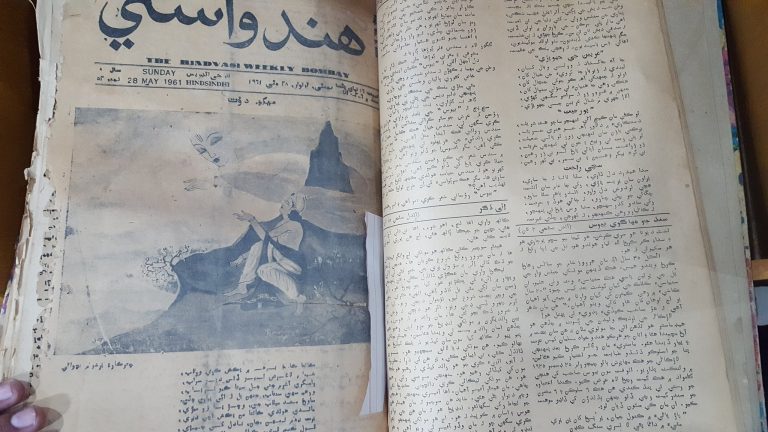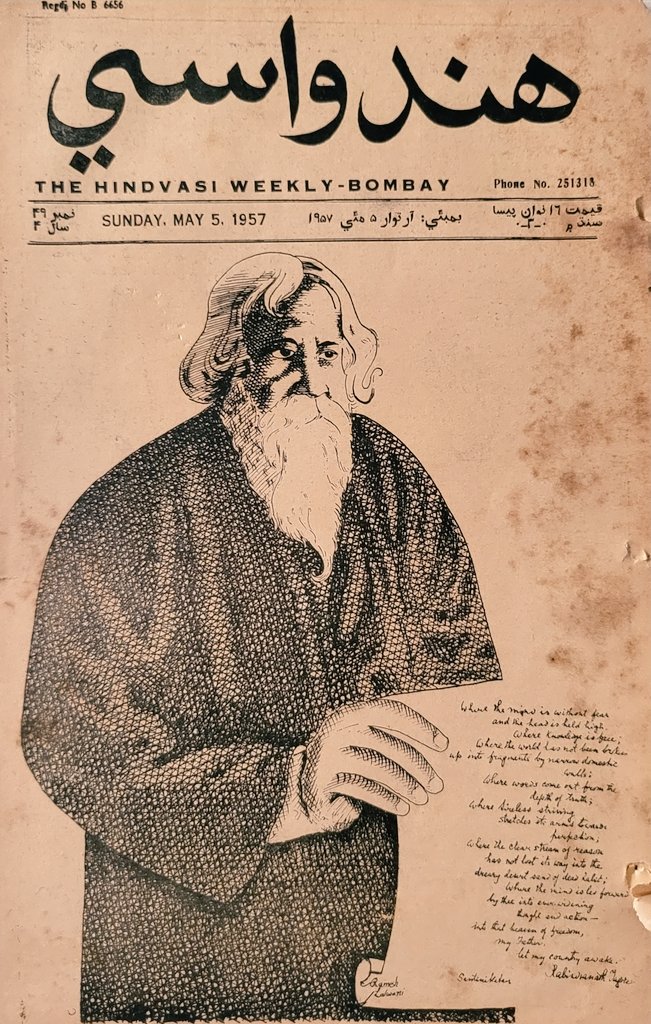
The European magistrate dispensing justice was no less than H.T. Sorley (d. 1969) a British Civil Servant of I.C.S. rank.
Late Prof. Dr. Allah Rakhio Butt
More than seven decades ago, on Saturday the 5th July 1919, the court of the Additional District Magistrate Hyderabad was jam packed with the people belonging to all walks of life. They had gathered there to witness the judgment in the much talked about the seditious charges against the editor of most popular local daily the Hindvasi. The European magistrate dispensing justice was no less than H.T. Sorley (d. 1969) a British Civil Servant of I.C.S. rank. At that time a young bureaucrat, he later became most illustrious scholar of Sindhi language and literature having at his credit many famous works including the Shah Abdul Latif of Bhit (1940) and the Gazetteer of province of Sindh. Sorley is remembered with profound respect for his meritorious literary services and long association with Sindh.
The accused on the other hand was not an ordinary person. He was Jethmal Parsram Gulrajani (1885-1948) editor and publisher of the Hindvasi, who later edited well-known periodicals namely the Bharatvasi (1920), the Ruha Rehan (1920), the Sindh Herald (1928) and the Parkash (1929). Famous theosophist and Swarajist Jethmal was also a learned man. He produced enormous amount of literature of social reform with a touch of political radicalism in it. Author of the well-known Sindh and its Sufis, he wrote more than three dozen books in English and Sindhi including translation of Hamlet, Tempest and Faust.
Originally a disciplined and strict teacher Jethmal belonged to the educated Amil community of Hyderabad. In protest against the compulsory vaccination program of the Government, he resigned his job in Education Department in or around 1911. In 1916, he joined the Home Rule League of Annie Besant and in April of the same year founded the Hindvasi, second oldest daily in Sindhi. He took active part in Home Rule Movement. These activities proved a turning point in his future literary and public careers for they transformed his outlook enormously. From 1916 and onward no literary, social and political gathering in Hyderabad was complete, if Jethmal did not attend it. He was an aggressive public speaker also.
The year 1919 was full of political upheavals and turmoil in India. The World War-I had just ended. Indians had supported the British cause during the war with an expectation that they will also be treated justly by the rulers and will be granted the promised self-rule or Swaraj. But the clever rulers deliberately shelved the popular public demand into cold storage. Not only had this, but to suppress the budding spirit of self-reliance, government come out with more stringent and repressive measures.
The fact of the matter was this, that the British had a wrong notion that the time had not yet come to grant India the right of self-government and generally ridiculed people’s demand for the self-government.
This is borne out by the Annual Administration Report of the Hyderabad Municipality for the year 1917-18, which contained highly sarcastic and most humiliating remarks by S.E.L. Carter, the Municipal Commissioner of Sindh R.E Gibson, the collector of Hyderabad District against the Sindhi members of the Hyderabad Municipality. The Daily Gazette, a widely circulated European owned daily of Karachi joined the government side and tried to tarnish the image of Sindhi members in an apparent bid to ridicule the self-rule demand.
 The aggrieved members and enlightened public, especially the Home Rule League supporters reacted violently against this attitude of rulers in Sindh. Jethmal led the opposition campaign and bitterly criticized unsympathetic and unsentimental attitude of the British and their mouthpiece in a leaflet: printed at his Sindh Bhaskar Press.
The aggrieved members and enlightened public, especially the Home Rule League supporters reacted violently against this attitude of rulers in Sindh. Jethmal led the opposition campaign and bitterly criticized unsympathetic and unsentimental attitude of the British and their mouthpiece in a leaflet: printed at his Sindh Bhaskar Press.
Every new day brought to light a fresh political controversy in Sindh and elsewhere in India, which was made the subject of Sindhi-owned newspapers that on 2nd February 1919, Mrs. Annie Besant, founder of the Home Rule League visited Hyderabad and other important places of province and inspired the people of Sindh to stand up for attainment of the Swaraj. She had yet to complete the Sindh tour on 06 February, the Government of India introduced notorious Rowlatt Bills before the Council. The political reaction to the new legislation was swift and spontaneous. The same day Gandhiji started Satyagraha movement against the Bills.
The Sindhis and their newspapers also protested forcefully. Jethmal and his daily Hindvasi remained unrivalled in the protest. On February 11th and 13th, and March 8th the Hindvasi published important extracts from the Rowlatt Bills.
The imperialist power caring little about the aspiration of the people passed on 18th March the Rowlatt Act, which curtailed all civil liberties of the people. Immediately Gandhiji proposed 30th March, 1919 as the day of humiliation and prayer. The masses responded enormously to the call. At Hyderabad a meeting convened on 29 March was addressed among others by Jethmal. On the following day almost all shops in Hyderabad remained closed, vehicular traffic ceased plying and life came to standstill. People fasted and took out long processions, in which many walked bare-headed and bare-foot. The administrative machinery used force against the protesters throughout India. The worst kind of brutality was exhibited at Delhi, where processionists were shot resulting heavy causalities. The rulers called it Delhi Riots, which aggravated the situation raising the political temper high.
Sunday April 6, was observed as national protest day against what happened at Delhi and elsewhere. On that day a mammoth public meeting of Satayagrahis was held at Holmstead Hall Hyderabad and condemned the passing of Rowlatt Act and mourned in support of the Delhi sufferers. Hon. G.M. Bhurgri presided over the function, where nationalistic songs were sung in Sindhi. The Sarhandi Pir of Tikhar recited from the Holy Quran and offered prayers for the “Martyrs”. Pandit Hoondraj chanted Sanskrit verses. A Sikh young man offered prayer according to the Sikh Scriptures. Those addressed the meeting included Hon. Bhurgri, Ali Akbar Hassanally, Shaikh Abdul Aziz and Jethmal Parsram.
Jethmal Becomes Aggressive
Jethmal paid a flying visit to Jacobabad during that week and addressed a protest meeting there. His driving passion was to get rid of the slavery of British imperialism. in Sindh and elsewhere in India anti-British feelings ran high every day that on 11 April, 1919 Gandhiji was arrested. The following day a massive protest meeting was held at Hyderabad and was addressed by many political leaders including Dr. Chotihram, Barrister Abdul Rehman, Shaikh Abdul Majeed and Jethmal. All of them made hair-raising speeches. The European owned contemporary the Daily Gazette paraphrased Jethmal’s speech:
“The time of trail was coming and he was glad that some of them were ready to go to jail. He asked the ladies to be prepared for separation of their brothers, husbands and sons. In the conclusion he and two others, Mr. Jeramdas and Sachoo Bania, a provision vendor, would sell proscribed literature and a new newspaper with the name of which was not declared was going to be published without declaration.”
The revolutionary writings and forceful speeches of Jethmal jolted the Sindh administration. His popularity was increasing considerably doing great harm to vested interests. Precipitating government action against Jethmal and his newspaper occurred the most dreadful Jalianwalla Bagh massacre on 13 April 1919.
The rulers got terribly frightened. Leaving Jethmal and his Hindvasi unrestrained was potentially dangerous for the government at the time of crisis. The time was ripe to strike in a befitting manner.
(Continues)
___________________
Courtesy: Wise Sindh